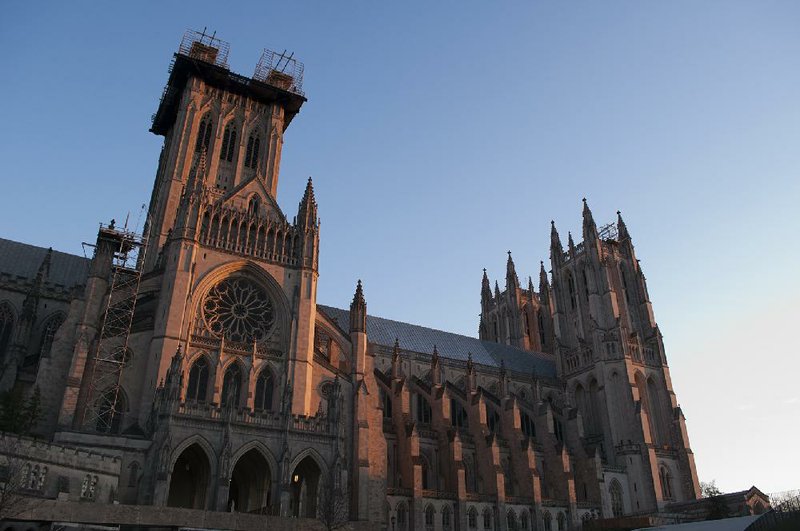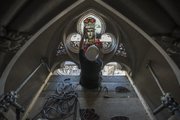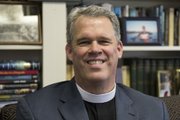WASHINGTON -- One of Randy Hollerith's earliest memories is of watching stonemasons at work at the Washington National Cathedral when his great-aunts took him there as a child. Now, as the nationally prominent institution's next dean, Hollerith will be responsible for stabilizing the cathedral in a different way.
The cathedral, a huge, soaring hilltop church known for hosting presidential funerals and other major national worship events, announced Monday that the 52-year-old Richmond priest will take over in August.
Hollerith follows Gary Hall, a gregarious, Hollywood-bred activist who brought the Gothic cathedral into the news by hosting same-sex weddings, gun control events and Muslim prayer, among other things. Hollerith isn't as widely known and describes himself as not driven by issues; he was picked out of a field of 32 candidates in good part because of his experience as a strategic fundraiser and manager. That's considered essential at a time when the cathedral needs to raise tens of millions of dollars to get on stable financial footing because of a damaging earthquake and a culture that is largely deserting its commitment to religious institutions.
If Hall's background as a former comedy writer
whose parents were nonpracticing Christians represented Americans' drifting relationship with organized religion, Hollerith's represents the flip side. His family was involved in the cathedral since its founding; his great-grandmother was there when the foundation stone was laid in 1907, and his brother and wife are Episcopal priests. (His brother Herman is the bishop of the Diocese of Southern Virginia, and his wife, Melissa, is chaplain at an Episcopal boys prep school, St. Christopher's.)
Hollerith is rector of St. James church in Richmond, Va., where he raised nearly $8 million to expand the building. He grew up in Alexandria, Va.
"I think I had my first experience of the holy standing in the nave of the cathedral," he told The Washington Post. "The deep awe and mystery of the divine -- I remember it being a very powerful moment."
Hollerith says he won't enter the position with plans to focus on specific social justice issues, a contrast to Hall, who was on the national news within a few months after coming in August 2012 by announcing that he'd open the cathedral to same-sex weddings.
"I'm not an issue-driven person. I'm a Gospel-driven person," he said. "Of course, the Gospel at times is prophetic and has things to say to the world. But I don't approach things from the point of view of hot-button issues, so to speak."
That doesn't mean he doesn't share with Hall and other recent deans a focus on one topic in particular: race. The Episcopal Church -- a small Protestant denomination that until recent decades represented the faith of the American elite -- has become less diverse racially in the past few decades, Hall said, and in 2016 must change that. The dwindling diversity in the pews has occurred even as the denomination has become increasingly liberal in its attitude, theology and partnerships, Hall said.
In Richmond, Hollerith's parish is working with a historically black church to campaign for public transit to make it easier for all residents to reach their jobs. When he starts talking about his vision for the cathedral, race is one of the first topics he brings up.
"I love the identity of the cathedral as a house of prayer for all people. I think that is such a wonderful vision for the place, especially in the middle of D.C., in the middle of our nation. As we feel so much stress and strain, there's so many opportunities for bringing together people of different faiths, different races."
Hall, who is now at the activist Southern California mega-church All Saints Pasadena, didn't leave because his penchant for making news clashed with the cathedral leadership. That isn't to say some didn't think he moved too fast on hot-button issues, including when he announced amid a national debate on the Confederate flag last summer that the cathedral should remove two stained-glass windows honoring Confederate generals Stonewall Jackson and Robert E. Lee. (A committee is still studying it.) Hall left two years earlier than expected because, at 66, he and others decided the cathedral needs major financial and programmatic changes that require a good 10-year commitment from a leader. The denomination requires clergy members to step down at age 72.
Leaders of the cathedral agree that its current endowment of $70 million needs to be much larger and that the entire financial model needs to shift.
When construction began in the early 1900s -- and through many of the 83 years of its construction -- "this was an era when the Mainline really felt they were part of the civic and spiritual underpinning of the entire nation," said Washington's Episcopal bishop, Mariann Edgar Budde, when Hall announced he was leaving. They didn't expect to have to innovate to bring in money; it would just come. Even until the late 2000s, she said, cathedral donors and leaders didn't buckle down on a sustainable financial plan to support the place. "Money was flowing in readily and there were huge bequests. All of it was, as best I can tell, spent as lavishly as it came in."
Hall says the cathedral needs major donors -- think Bill Gates, he said -- and a new outlook to get where it needs to be financially.
The cathedral "is there to articulate how you live Gospel values in the public space. We're not there to tell people to eat their vegetables," Hall said. "We're there to say what the implications of the Gospel mean for our public role. ... Today to raise money you have to do something transformative and visionary. People don't want to give just to keep stained glass repaired. Bill Gates gives to cure malaria, not to fix the parking lot."
David Kautter, chairman of the chapter, the body that governs the cathedral, said the search committee that picked Hollerith named five main criteria: spiritual leadership, strategic thinking, managerial experience, development experience and a history of convening people.
Kautter said Hollerith rose to the top of a field of 32 candidates, which initially included men and women, in large part because of his experience as a fundraiser. Hollerith has led three development campaigns, raising nearly $8 million at his current parish to significantly expand a building that the congregation had outgrown. "It wasn't just like he was showing up every day in his old job. He was strategic about the development and about the operations," Kautter told The Post. "Those really stood out, when you combined it with being a spiritual person and having a pastoral nature."
When he left last year, Hall estimated that the cathedral needed to raise $50 million a decade over the next 30 years to be sustainable. It hasn't had a capital campaign since the 1990s. Its current budget is about $14 million and tight; the cathedral just last month had to let a few staff members go in order to shift money into Sunday worship services and music.
The cathedral has already spent $13 million for repairs from a 2011 earthquake that toppled pinnacles and caused extensive damage. Kautter said the institution needs an additional $24 million to $26 million to complete that work.
Hollerith says he's excited about fundraising, adding, "I can bring some good stewardship." He is comfortable using the language of business to describe his task, saying, "I think the Episcopal Church is a wonderful brand, so to speak."
Kautter praised Hollerith's spiritual side. "He's very pastoral. After you finish talking to him, you always feel better than you did before you started. He's a great listener."
Selecting a more low-key, less deliberately visible dean doesn't mean the cathedral wants to highlight social issues less, Kautter said. That would be "an assumed attribute." Hollerith just has a different style. While he relates his sermons to current-day topics, Kautter said, "he's not somebody who says, 'I'm going to pick my three issues this year.'"
Hollerith is a former college football player who values sacred music, which at his Richmond parish has included a jazz Eucharist that draws more than 800 worshippers. He and his wife -- they met at Yale Divinity School -- have two children, one who is in college and the other who will begin in the fall.
Religion on 05/28/2016


